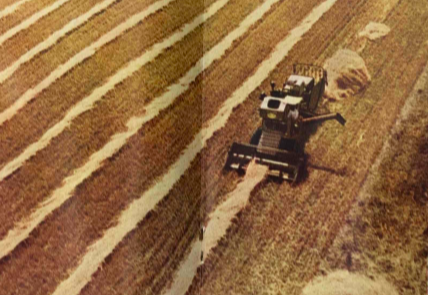
"Soviet collective and state farms report good crops in spite of a bad drought in some regions of the country." (USSR Magazine, Sept. 1959)
Impact
Iowa Corn Field (The Kinnick Project, N.d.)
Soviet Agriculture
Garst and Khrushchev's diplomatic relationship successfully impacted Soviet agricultural productivity through mechanization, fertilization, and use of hybrid seed corn, as Soviet corn acres grew from nearly 9 million in 1953 to 60 million in 1962 (Hill, 90).

"Soviet collective and state farms report good crops in spite of a bad drought in some regions of the country." (USSR Magazine, Sept. 1959)
"Nikita Khrushchev began the process that turned Russia from an agriculturally backward nation that for many years couldn't feed itself, into a nation that today is the third largest exporter of grains behind the U.S. and western Europe."
-Victor Lishchenko, director of Russia's Center of International Agribusiness (Wallaces Farmer, 3 Apr. 2015)
However, since Khrushchev fell far short of achieving his seven-year plan to outproduce the U.S. and many Soviets still went hungry due to communist inefficiencies, soil, and climate issues, the Soviet government considered his results a failure and removed Khrushchev from power in 1964.
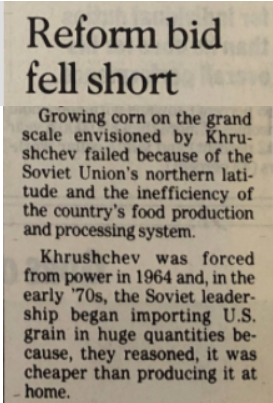
(The Des Moines Register, 6 Feb. 1995)
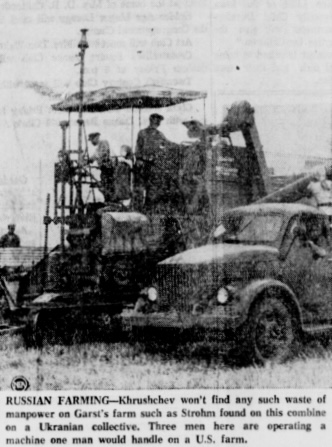
(Ames Daily Tribune, 16 Sept. 1959)

(Wall Street Journal, 10 Aug. 1959)
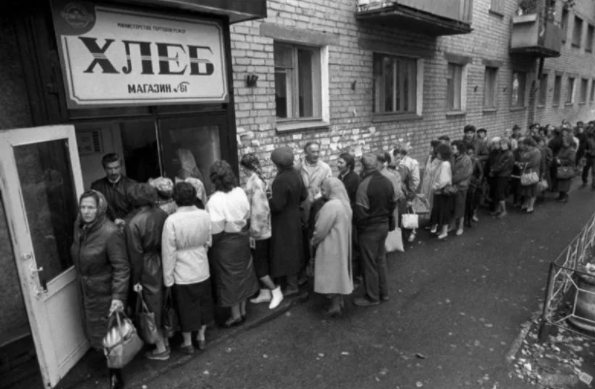
Soviet breadline (Scrapushka-nsk, N.d.)
"The first time I went there, Soviet agriculture was almost that of a backward country. Today, the production is not as high as it ought to be but almost half the people have moved off the farm. They have made great progress. Unfortunately, at the same time they were making progress, the U.S. was making magic."
-John Chrystal, Garst's nephew (C-SPAN, 15 Feb. 1990)
Cold War Relations
Garst's agricultural exchanges with Khrushchev created momentum for successful diplomatic negotiations with President Eisenhower at Camp David and progress toward peace.
"Nikita Khrushchev's Visit to the Garst Farm." (World Food Prize Foundation, 27 Sept. 2018)
"It seems to me that in those years, when the turn came from war toward peace or, to be more precise, toward peaceful coexistence between the two systems, the friendship between those two men, Garst and Father, was no less fruitful than many months of negotiations by veteran diplomats."
-Sergei Khrushchev (American Heritage, 1999)
Although the May 1960 U-2 spy plane incident and 1962 Cuban Missile Crisis returned Cold War tensions to dangerous levels, Garst maintained a warm relationship with Khrushchev through letter exchanges and visits. Additionally, for several decades, Garst’s nephew John Chrystal continued his legacy of successfully aiding Soviet food production and diplomatic relations by serving as informal agricultural ambassador to the USSR.

(Des Moines Sunday Register, 8 May 1960)
"I have gone to the Soviet Union without opinion in the interest of doing well by this country and in bridging the gap of ill feelings and good feelings."
-John Chrystal, Garst's nephew (C-SPAN, 15 Feb. 1990)
Peace Through Agriculture
Through successful person-to-person diplomacy, Garst established the power of human connection and mutual reliance on agriculture as a replicable method for achieving peace.
"Garst's work was rooted in a deep interest in and concern for his fellow man and his lifelong effort to improve the lot of mankind."
-William Brown, Pres., Pioneer International (Cedar Rapids Gazette, 9 Nov. 1977)
Garst's methods were and continue to be recognized as a successful approach for reducing international conflict through promoting economic self-sufficiency in food insecure and politically vulnerable areas of the world today.
-Tom Vilsack, U.S. Secretary of Agriculture (Personal interview, 2 Dec. 2021)
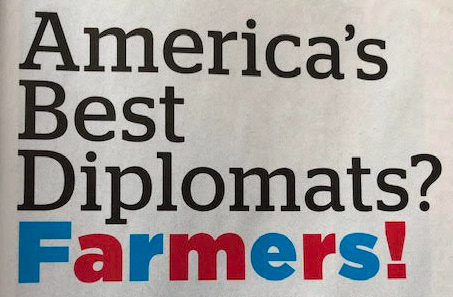
(Successful Farming, Sept. 2021)
"The role of agriculture in building peace [and] promoting peace, is one of the most incredible strengths of that noble profession. Particularly, the role of farmers and scientists in shaping relations between our country and other countries, whether it's Russia, China, or elsewhere, is very, very significant."
-Ambassador Kenneth Quinn, President Emeritus, World Food Prize Foundation (Personal interview, 22 Mar. 2022)